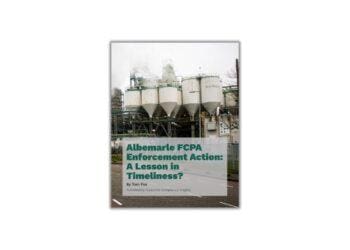Hogan Lovells’ Stephanie Yonekura and Ann Kim examine the impact of mammoth relief spending, widespread remote work and other key developments on anti-corruption that enforcement will have globally in the near future.
The massive sums of government funds allocated to respond to the COVID-19 pandemic and an unprecedented urgency to distribute those funds have created opportunities for corruption at the very time that remote working threatens to weaken traditional compliance mechanisms.
These conditions are certain to shape anti-corruption enforcement in 2021. However, these are not the only noteworthy developments. Below, we highlight a few key trends corporate executives and compliance personnel should be aware of.
Report: The Global Bribery and Corruption Outlook for 2021
More International Cooperation Means More Multicountry Investigations
We expect continued active cooperation among authorities across jurisdictional boundaries in the investigation of corruption offenses. Last year, U.S. enforcement agencies cooperated with global enforcers in Brazil, El Salvador, France, Guatemala, Guernsey, Italy, Luxemburg, Malaysia, Panama, Singapore, Switzerland and the United Kingdom to resolve FCPA investigations. And, France, through its Parquet National Financier and Agence Française Anticorruption, began to emerge as a more active enforcer.
Corporations must be prepared to manage multijurisdictional internal investigations. This requires being ready to engage outside counsel that has experience effectively implementing a global strategy to resolve investigations with multiple enforcement agencies – while also navigating country-specific laws that may conflict with one another; this is especially the case in such spheres as privileged data protection, state secrets, international transfers of classified information and controlled technology, and sanctions.
In addition, resolving multijurisdictional investigations requires navigating policies aimed at avoiding duplicative penalties. In the U.S., the “anti-piling-on policy,” which has been incorporated into section 1-12.100 of the Justice Manual, seeks to minimize the imposition of duplicative penalties from multiple enforcement agencies and jurisdictions for the same conduct. However, a recent resolution of the Beam Suntory FCPA investigation raises some interesting questions about this policy and how the Department of Justice (DOJ) and the Securities and Exchange Commission (SEC) may view cooperation differently.
In October 2020, Beam Suntory, a global producer and distributor of distilled beverages, entered a deferred prosecution agreement (DPA) with the DOJ and agreed to pay $19.5 million to resolve allegations that it engaged in a conspiracy to violate the anti-bribery, internal controls and books and records provisions of the FCPA. This settlement followed a 2018 SEC settlement related to the same conduct. The DOJ settlement awarded only partial cooperation credit to Beam Suntory and declined to credit the company for making a voluntary disclosure to the SEC, despite the fact that the SEC had previously awarded the company full cooperation credit and credit for self-disclosure.
Perhaps more significantly, the DOJ did not credit the SEC penalty in the criminal settlement because Beam Suntory “did not seek to coordinate a parallel resolution” with the DOJ. This decision calls into question the extent of the DOJ’s commitment to work with other enforcement agencies to avoid “piling on.” The DOJ appears to be emphasizing that companies that seek full cooperation credit should accept responsibility quickly, and that if they seek to resolve matters with other enforcement agencies, they should ensure they are coordinating and being consistent with all the agencies. More clarity about this and other DOJ policies may be forthcoming as new leadership takes the helm under the Biden administration.
The role of the U.K.’s Serious Fraud Office (SFO) in multinational investigations may also be re-shaped in the coming year. It is not yet clear how the Brexit deal that came into force on January 1, 2021 will affect the U.K.’s status as an international financial services hub and whether any diminished role as such causes a corresponding diminishment in the SFO’s status as a leading international enforcement agency. Although U.K. and European enforcement agencies have consistently signaled their intentions to continue to support one another in investigating and prosecuting economic crime, cooperation is likely to be hampered by the U.K.’s loss of access to the EU’s enforcement agencies Europol and Eurojust, the EU’s enforcement databases, the European Investigation Orders framework and the European Arrest Warrants system. The Brexit deal does, however, provide for cooperation in some important areas, including continued sharing of DNA and fingerprint data and the continued transfer of airline passenger name records; crucially, the deal also provides for U.K. and EU agencies to continue to set up joint investigation teams.
Continued Focus on Individual Prosecutions
The number of individual prosecutions under the FCPA have markedly increased over the past five years, and we expect the Biden administration to continue to focus on individual prosecutions to deter bribery and corruption schemes. Outside the U.S., recent high-profile prosecutions of individuals indicate that global authorities are also focused on holding individuals accountable. For instance, this trend is evident in (1) a multijurisdictional investigation of Isabel dos Santos, the daughter of the former Angolan president José Eduardo dos Santos; (2) a recent conviction secured by Swiss prosecutors of Bernardo Schiller Freiburghas − a Swiss-Brazilian dual national − on bribery and money-laundering charges related to operation “Car Wash;” and (3) a far-reaching Mexican investigation into corruption by former Mexican public officials.
Settlements Will be More Expensive, But More Flexible
2020 saw record-setting bribery and corruption settlements. But at the same time, the U.K. and other national enforcement authorities have signaled they are becoming increasingly comfortable using agreements similar to the deferred prosecution agreements long-employed by U.S. enforcers to encourage companies to voluntarily report wrongdoing and to cooperate with investigators.
The SFO issued updated DPA guidance in October 2020 confirming that a DPA is available to companies that admit to misconduct, pay a financial penalty and agree to specific conditions set out by the prosecutor to ensure future cooperation and compliance. Recent DPA cases make it clear that cooperation remains the key consideration, and we therefore expect the SFO’s increasing use of DPAs to continue – particularly with companies that offer broad cooperation.
In Germany, a draft bill, The Corporate Sanctions Act, would permit the criminal prosecution and conviction of a corporate entity in two circumstances: (1) when the entity’s directors or officers committed corporate crimes; or (2) when the entity did not take reasonable precautions to prevent employees or agents from engaging in criminal wrongdoing within the scope of their employment or agency. The Corporate Sanctions Act would also allow for prosecutions to be deferred, provided the company satisfies certain conditions and directives. Such directives can best be compared to deferred prosecution agreements, with the option to impose what the legislator is calling a “competent body” – a process very similar to the U.S. practice of imposing a compliance monitor where criteria specified in an October 2018 memorandum entitled “Selection of Monitors in Criminal Division Matters” so warrant.
In Spain too, although there is, thus far, little practical experience using independent corporate monitors, steps are being taken toward a system resembling those of the U.S. and other European jurisdictions, which allow for agreements with the authorities and can include the use of independent monitors.
Because company boards of directors often seek the certainty of the least-worst option to resolve a bribery or corruption investigation, we expect investigations in many jurisdictions to continue to be resolved through deferred prosecution agreements or similar mechanisms. Some of these agreements will require the imposition of an independent compliance monitor, and we expect that these policies will continue to encourage self-reporting.
Compliance Programs Are More Important Than Ever
The effectiveness of corporate compliance programs also continues to be an important consideration for numerous enforcement agencies and may mitigate potential sanctions for bribery and corruption. In the U.S., the DOJ recently issued updated guidance about how the Department will evaluate corporate compliance programs. In early 2020, the SFO also released new internal guidance as part of its Operational Handbook, emphasizing that a compliance program should be effective and not simply a “paper exercise.” It further indicates that the SFO may evaluate compliance programs at several points during an investigation and underscores how important it is for corporations to document their compliance efforts.
The proposed Corporate Sanctions Act in Germany would also allow the sentencing court to take into consideration whether the company in question had implemented an adequate compliance program before the criminal wrongdoing, even if that system did not prevent the violation of criminal laws. It is, therefore, more essential than ever that companies implement an effective and well-documented compliance program.
Expanded remote operations may present new challenges for compliance programs. Extra care must be taken, given the diminished ability to impose physical oversight over stakeholders. Mitigating the risks associated with conducting business virtually may require improving the efficacy of internal controls; ensuring that compliance, internal audit and legal departments are in sync; and providing training and other opportunities for interactions with employees during this period.
As data expands exponentially, data analytics platforms may also be harnessed for compliance purposes. We expect companies to increasingly employ new and innovative risk-management technologies that rely on machine learning and artificial intelligence (AI) to spot and assess patterns of problematic conduct quickly and efficiently. As with every promising new tool and technology, there are challenges. Although machine learning and AI can help keep costs down over time, they require substantial investment early on – both in terms of monetary resources and human input; machine learning applications are only as robust as the data inputs and algorithms developed to allow them to function independently.
Focus on COVID-19-Related Fraud
Numerous enforcement agencies around the globe have declared their intent to investigate criminal activity relating to the COVID-19 pandemic. We therefore expect a growing focus on bribery and corruption risk arising out of the global health crisis.
As noted, the impact of the pandemic on business practices around the world, rapidly transforming the way many businesses operate and straining resources devoted to compliance supervision, has created an environment ripe for bribery and corruption. Adding to this heightened risk are the various fiscal stimulus measures implemented by governments across the globe. Lawyers in Indonesia, for instance, have reported that several companies have given grants to the government, ostensibly to help the government contain the spread of COVID-19. Such transactions could provide cover for bribery, corruption or other efforts to improperly influence officials.
With all of the economic strain the pandemic has placed on businesses, coupled with the pressure to maintain fiscal stability (or even in some circumstances to achieve fiscal growth), we expect enforcement agencies around the globe to take a close look in the coming year at businesses that have taken advantage of government support, examining the ways government contributions have been obtained and used. Companies should, therefore, look back at their activities during the pandemic – in particular auditing compliance procedures to ensure they have held up to the stresses of the health crisis.



 Stephanie Yonekura is a partner at
Stephanie Yonekura is a partner at  Ann Kim is a partner at Hogan Lovells, where she draws upon a wealth of knowledge from her experience working as a federal prosecutor and SEC enforcement division senior counsel to advise clients and provide insight on how to navigate civil regulatory and criminal government probes. She represents clients from the earliest stages of an investigation through trial in anti-corruption and other complex matters. Ann leverages her legal acumen and trial experience to advise clients across various industries, including public companies, health care organizations, financial institutions and investment funds.
During her five years at the U.S. Attorney’s Office and seven years at the SEC, Ann investigated and prosecuted numerous high-profile fraudulent schemes in parallel DOJ/SEC actions, including violations of the Foreign Corrupt Practices Act, federal securities laws, fraudulent investment schemes by broker-dealers and investment advisors, health care fraud and insider trading cases that involved Fortune 500 companies.
Ann Kim is a partner at Hogan Lovells, where she draws upon a wealth of knowledge from her experience working as a federal prosecutor and SEC enforcement division senior counsel to advise clients and provide insight on how to navigate civil regulatory and criminal government probes. She represents clients from the earliest stages of an investigation through trial in anti-corruption and other complex matters. Ann leverages her legal acumen and trial experience to advise clients across various industries, including public companies, health care organizations, financial institutions and investment funds.
During her five years at the U.S. Attorney’s Office and seven years at the SEC, Ann investigated and prosecuted numerous high-profile fraudulent schemes in parallel DOJ/SEC actions, including violations of the Foreign Corrupt Practices Act, federal securities laws, fraudulent investment schemes by broker-dealers and investment advisors, health care fraud and insider trading cases that involved Fortune 500 companies.







